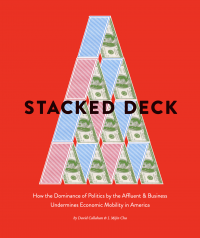Introduction
If there is one idea that nearly all Americans can agree on, it is that everyone should have a chance to improve themselves and do better in life. At the same time, Americans strongly believe in political equality—the view that civic life should be a level playing field and everyone should have a voice in the decisions that affect their lives.
Yet today, there is wide recognition that America is not living up to either of these cornerstone ideals. A host of indicators show that the middle class is struggling—and worse, shrinking—and that upward mobility is elusive for many Americans. Meanwhile, evidence abounds that the U.S. political system is increasingly dominated by wealthy interests, and strong majorities of the public believe—rightly—that the deck is stacked against ordinary voters.
What is less understood, though, is the interplay between these two problems—the way that a tilting of political life toward business and the wealthy has served to undermine economic mobility. As private interests have come to wield more influence over public policy, with ever larger sums of money shaping elections and the policymaking process, our political system has become less responsive to those looking for a fair shot to improve their lives and move upward. Recent developments have aggravated this long emerging trend. In particular, the Citizens United ruling and the rise of Super PACs have expanded the ability of wealthy individuals and corporations to shape election outcomes and set the policy agenda in Washington and state capitals across the country.
These inequities in political power would still be unfair, but might not matter as much, if the interests of the affluent and corporations were closely aligned with those of the general public. But this is often not the case. Wealthy interests are keenly focused on concerns not shared by the rest of the American public, like keeping taxes low on capital gains, and often oppose policies that would foster upward mobility among low-income citizens, such as raising the minimum wage. Even when the wealthy do share the public’s strong enthusiasm for policies that help Americans get ahead, such as spending on higher education, they often prioritize tax cuts or deficit reduction in ways that squeeze the resources available for these very policies.
This paper offers an overview of the interplay between declining upward mobility and growing political inequality, which we show is a self-reinforcing phenomenon. It reports on a growing body of new research on this nexus and offers a set of policy recommendations to reduce both political and economic inequality.
Download the full report
Download the one pager



